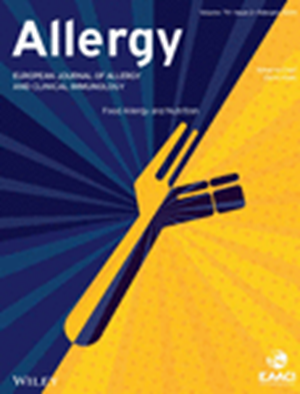变应性鼻炎中医治疗国际循证指南。
IF 12
1区 医学
Q1 ALLERGY
引用次数: 0
摘要
变应性鼻炎(AR)是一种常见的慢性疾病,严重影响患者的生活质量,并对有效的治疗提出了挑战。中医提供了一个整体的方法,强调辨证、个体化护理和自然治疗策略。目的:结合严格的证据评估和专家共识,为中医干预治疗急性呼吸道感染制定全面的循证指南。方法采用GRADE-TCM框架制定指南,分析351项随机对照试验(rct),涉及43,276名受试者。补充证据来自出版的教科书、规范文件、古代文献和中医病历。经过5轮专家共识,80位专家人次、1万余份有效回复,完善了建议。结果该指南提供了32项建议,涵盖了主要涉及AR的四种主要中医证候(肺气虚寒、脾气虚虚、肾阳虚、肺经潜热),这些建议包括内部干预(如中成药)和外部治疗(如针灸和其他穴位治疗)。在这些干预措施中,10项得到强烈建议,22项被列为弱建议。中医药治疗在缓解AR症状、减少复发、提高生活质量方面疗效显著。此外,中药可以补充传统的AR治疗,减少对药物治疗的需求,同时保持良好的安全性。结论该指南将经典中医原则与现代循证方法论相结合,为AR管理提供了一个结构化的框架。它们可作为全球从业人员的临床参考,支持一种有前途的AR治疗方法。未来的更新将纳入新出现的证据和实际临床数据,以进一步优化中医药在AR管理中的作用。本文章由计算机程序翻译,如有差异,请以英文原文为准。
International Evidence-Based Guidelines for Traditional Chinese Medicine Management of Allergic Rhinitis.
BACKGROUND
Allergic rhinitis (AR) is a prevalent chronic condition that significantly impacts patients' quality of life and poses challenges to effective management. Traditional Chinese medicine (TCM) offers a holistic approach, emphasizing syndrome differentiation, individualized care, and natural treatment strategies.
OBJECTIVE
To develop comprehensive evidence-based guidelines for AR management using TCM interventions, incorporating rigorous evidence assessment and expert consensus.
METHODS
The guidelines were developed using the GRADE-TCM framework, analyzing 351 randomized controlled trials (RCTs) involving 43,276 participants. Supplementary evidence from published textbooks, standardized documents, ancient literature, and TCM medical records was incorporated. Five rounds of expert consensus, involving 80 expert person-times and over 10,000 valid responses, refined the recommendations.
RESULTS
The guidelines provide 32 recommendations covering four primary TCM syndromes (Deficiency-cold of Lung Qi, Spleen Qi Deficiency and Weakness, Kidney-yang Deficiency, and Latent Heat in Lung Meridian) which are mainly involved in AR. These recommendations include both internal interventions (such as herbal and patent medicines) and external therapies (such as acupuncture, moxibustion, and other acupoint-based treatment). Of these interventions, 10 received strong recommendations, while 22 were classified as weak recommendations. TCM treatments demonstrated significant efficacy in alleviating AR symptoms, reducing recurrence, and improving quality of life. Additionally, TCM can complement conventional AR treatments by reducing the need for pharmacological therapy while maintaining a favorable safety profile.
CONCLUSION
The guidelines integrate classical TCM principles with modern evidence-based methodologies, offering a structured framework for AR management. They serve as clinical references for practitioners worldwide, supporting a promising approach to AR treatment. Future updates will incorporate emerging evidence and real-world clinical data to further optimize the role of TCM in AR management.
求助全文
通过发布文献求助,成功后即可免费获取论文全文。
去求助
来源期刊

Allergy
医学-过敏
CiteScore
26.10
自引率
9.70%
发文量
393
审稿时长
2 months
期刊介绍:
Allergy is an international and multidisciplinary journal that aims to advance, impact, and communicate all aspects of the discipline of Allergy/Immunology. It publishes original articles, reviews, position papers, guidelines, editorials, news and commentaries, letters to the editors, and correspondences. The journal accepts articles based on their scientific merit and quality.
Allergy seeks to maintain contact between basic and clinical Allergy/Immunology and encourages contributions from contributors and readers from all countries. In addition to its publication, Allergy also provides abstracting and indexing information. Some of the databases that include Allergy abstracts are Abstracts on Hygiene & Communicable Disease, Academic Search Alumni Edition, AgBiotech News & Information, AGRICOLA Database, Biological Abstracts, PubMed Dietary Supplement Subset, and Global Health, among others.
 求助内容:
求助内容: 应助结果提醒方式:
应助结果提醒方式:


